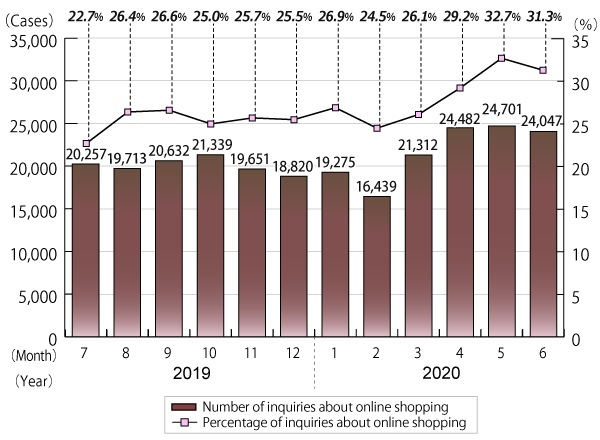Caution! Troubles over online shopping on the increase affected by new normal of consumption
In the midst of the novel coronavirus pandemic, one of the best practices in a new normal is online shopping. According to data registered with PIO-NET1, troubles over online shopping are on the increase. In May 2020, the monthly number of inquiries and complaints related to online shopping accounted for over 30% of the monthly sum of inquiries and complaints.
Affected by the new normal, troubles related to online shopping are expected to further increase. Therefore, NCAC decided to outline troubles over online shopping affected by the novel coronavirus pandemic and share key points to avoid such troubles.
Diagram: Monthly number and percentage of inquiries about online shopping registered with PIO-NET

Accessible version
- 1 PIO-NET is a database that collects information on inquiries concerning consumer affairs by linking NCAC with local consumer affairs centers and similar organizations across Japan via an online network. The above graph shows data registered through July 31, 2020, excluding inquiries referred from local consumer affairs centers to NCAC.
Trends of inquiries and complaints registered with PIO-NET
Number of contract signatories by age group related to inquiries about online shopping
According to data registered with PIO-NET, many troubles were experienced by all the age groups particularly from April through June 2020. The growth rate of cases experienced by consumers aged under 20 is the highest: the number from April through June 2020 is about 1.8 times compared to that in the same period last year.
Common troubles related to online shopping
- Numerous inquiries about health food were received from the quarter July?September 2019. Many consumers were attracted by ads highlighting low prices for trial purchase and placed an order. Later they found that they were supposed to buy the product several times under the contract.
- In January-March and April-June 2020, there was a rise in inquiries about articles for personal use including clothes, bags, shoes and furniture (e.g. "My order has not been delivered yet," "An inferior or fake product was delivered."). There have been fraudulent online businesses.
- Various anti-COVID-19 products are on the market, such as face masks, clinical thermometers and alcohol disinfectants. Since February 2020, there have been numerous inquiries about these products (e.g. "The products are sold at high prices," "My order has not been delivered yet," "An inferior product was delivered.").
- There have been numerous inquiries about contractual troubles related to services (e.g. movie distribution services, online games played on smartphones or game machines), in addition to those related to tangible products.
Sampling of inquiries and complaints
- [Case 1]
- My high school daughter placed an order for diet green juice without noticing she made a contract for regular purchase. When she requested cancellation of the contract, she was charged an expensive cancellation fee.
- [Case 2]
- I used an online shopping site for the first time to practice a new normal. Although two weeks have passed since ordering, my order has not been delivered yet.
- [Case 3]
- I placed an order for a famous brand watch at a special price. At a later date, a fake product different from photos was delivered to me.
- [Case 4]
- I have been charged by a video streaming site even after canceling the contract.
- [Case 5]
- My elementary school son used his grandma's smartphone and paid an expensive fee to an online game site.
Advice for consumers
- Mail-order sale is not subject to the cooling-off rule. Before placing an order, confirm the return policy, terms of cancellation and seller's contact information.
- There are fraudulent shopping sites intending to swindle money and personal information out of consumers out of consumers. If you feel suspicious about a site even slightly, do not use the site.
- It has been reported that many consumers intended to buy just once and later they were charged a high price. Before placing an order, confirm contract details to find out whether the contract you are going to make is for regular purchase or not.
- Protect minors from online troubles. Parents or other carers should pay attention to them.
- In case of concern or trouble, or when you feel suspicious about something, consult your local consumer affairs center right away.
